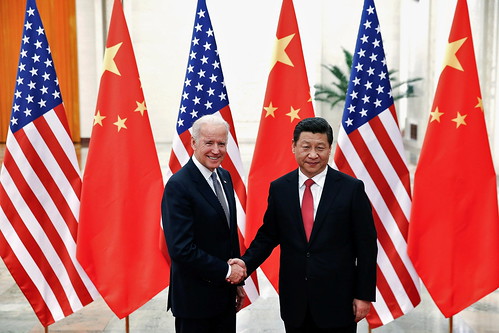This piece was reprinted by OpEd News with permission or license. It may not be reproduced in any form without permission or license from the source.
When China's President XI Jinping meets with President Joe Biden Monday in Indonesia, he better bring a whiteboard, and some simple handouts.
For it is beyond the ability, or the intention, of Biden's elitist advisers to give him an accurate picture of the extremely close strategic relationship between China and Russia - and between XI and Putin, personally.
Can Secretary of State Antony Blinken, and national security adviser Jake Sullivan, be so dense? That cannot be ruled out. But perhaps it is more likely that they - and the neocons behind U.S. foreign policy - simply do not want to give the president any reason to flinch in his Captain Ahab pursuit of weakening Russia in Ukraine, "for as long as it takes."
Were they to warn Biden that he could face a two-front war with peer adversaries - Russia and China - he might opt for a more sensible policy. Biden might even be brought to understand that, for Putin, the conflict in Ukraine poses the same kind of existential threat that, say, President John Kennedy faced 60 years ago from Soviet nuclear ballistic missiles in Cuba.
Likewise, Biden might be able to appreciate that China and Russia are each fully aware that if one of them goes down, the other is next in the sights of a US military, desperate to get back on the winning track after so many misadventures over the last 77 years.
Has Biden been told that, contrary to all expectations, China gave Putin a waiver on its bedrock Westphalian policy on sovereignty and noninterference, and that XI has made it clear that China supports Russia's "core interests" in Europe, just as Russia supports China's "core interests" vis-Ã -vis Taiwan.
When the planned Biden-Xi meeting was announced Wednesday, Biden was asked whether the Chinese and the Russians are "putting together a real alliance," Biden said:
"I don't think there's a lot of respect that China has for Russia or for Putin. I don't think they're looking at it as a particular alliance. Matter of fact, they've been sort of keeping their distance a little bit".
Wrong: "Keeping their distance a little bit?" The adolescent-type textual analysis adduced for this media "insight" over recent weeks is rubbish. As to the far more important question as to whether Russia and China have a formal defense alliance or something short of that, well, this became largely moot on December 15, 2021 when President XI stated that "this relationship even exceeds an alliance in its closeness and effectiveness."
Administration officials and the media have obediently insisted that "the two countries do not have a formal alliance". This is technically correct. It is also a distinction without much real difference. Prudent strategic planners would take this into account, and advise the president accordingly - particularly as the conflict in Ukraine escalates, as do tensions along China's Pacific frontier.
Putin's Main Squeeze
With the obvious lack of prudent planners in Washington, it will fall to XI and his whiteboard to give Biden a tutorial during their meeting in Bali. For, sadly, it appears President Biden is still as misinformed about the Sino-Russian relationship as he was on June 16, 2021 during his only in-person summit with President Putin in Geneva. Embarking on the plane, Biden let it be known that the "Russians are in a difficult spot being squeezed by China."
And here is the bizarre way Biden described, at his post-summit presser, his decades-behind-the-times approach to Putin on China:
"Without quoting him [Putin] - which I don't think is appropriate - let me ask a rhetorical question: You got a multi-thousand-mile border with China. China is seeking to be the most powerful economy in the world and the largest and the most powerful military in the world."
(Note: You can view every article as one long page if you sign up as an Advocate Member, or higher).






